PREVIOUS
Women’s Reservation Bill 2023 – Part 2
October 10 , 2023
828 days
3174
0
(இதன் தமிழ் வடிவத்திற்கு இங்கே சொடுக்கவும்)
Women’s Reservation Bill
Rotation of Seats
- Seats reserved for women will be rotated after each delimitation, as determined by a law made by Parliament.
Significance of the bill
- The significance of the Women’s Reservation Bill in India is multifaceted and has far-reaching implications.

Representation of Women in Legislature
- Globally, women currently occupy only 26.7% of parliamentary seats and 35.5% of local government positions.
- Such a step by India, a large economy can have a positive impact globally as well.
Gender Equality and Empowerment
- The primary objective of the bill is to promote gender equality and empower women by providing them with adequate political representation.
- Women constitute nearly half of India’s population, and ensuring their participation in decision-making processes is a fundamental aspect of gender justice.
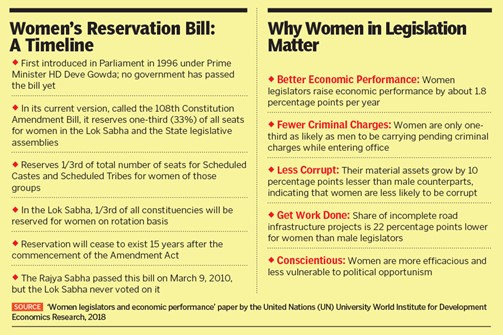
Political Participation
- The bill aims to increase the political participation of women at all levels of government.
- By reserving seats for women, it encourages women to enter politics, contest elections, and hold public office.
Women’s Voices and Issues
- Increased representation of women in legislatures ensures that women’s voices are heard on critical issues, including those related to women’s rights, education, health, and safety.
- It can lead to policies and legislation that address gender-based discrimination and violence.
- Women elected to political office can serve as role models for other women and girls.
- It is inspiring them to pursue leadership roles in various fields, including politics.
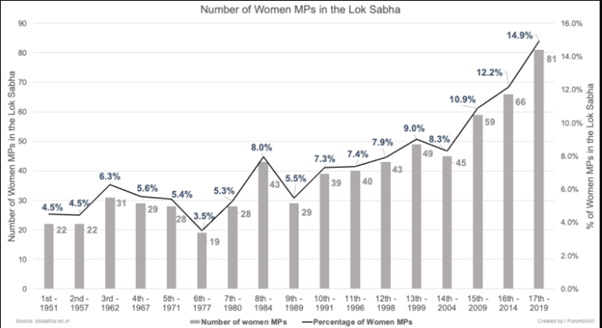
Tackling Patriarchy
-
The reservation of seats for women challenges traditional gender roles and stereotypes.
-
It is challenging the patriarchal nature of Indian politics and society.
Gender Inclusive Governance
- Research has shown that gender d iversity in decision-making bodies.
- It is including legislatures, often leads to better governance and decision-making, as diverse perspectives and experiences are considered.
Social and Economic Development
- Empowering women politically can have positive effects on social and economic development.
- It can lead to policies that promote gender-sensitive development, improved access to education and healthcare for women, and increased economic opportunities.
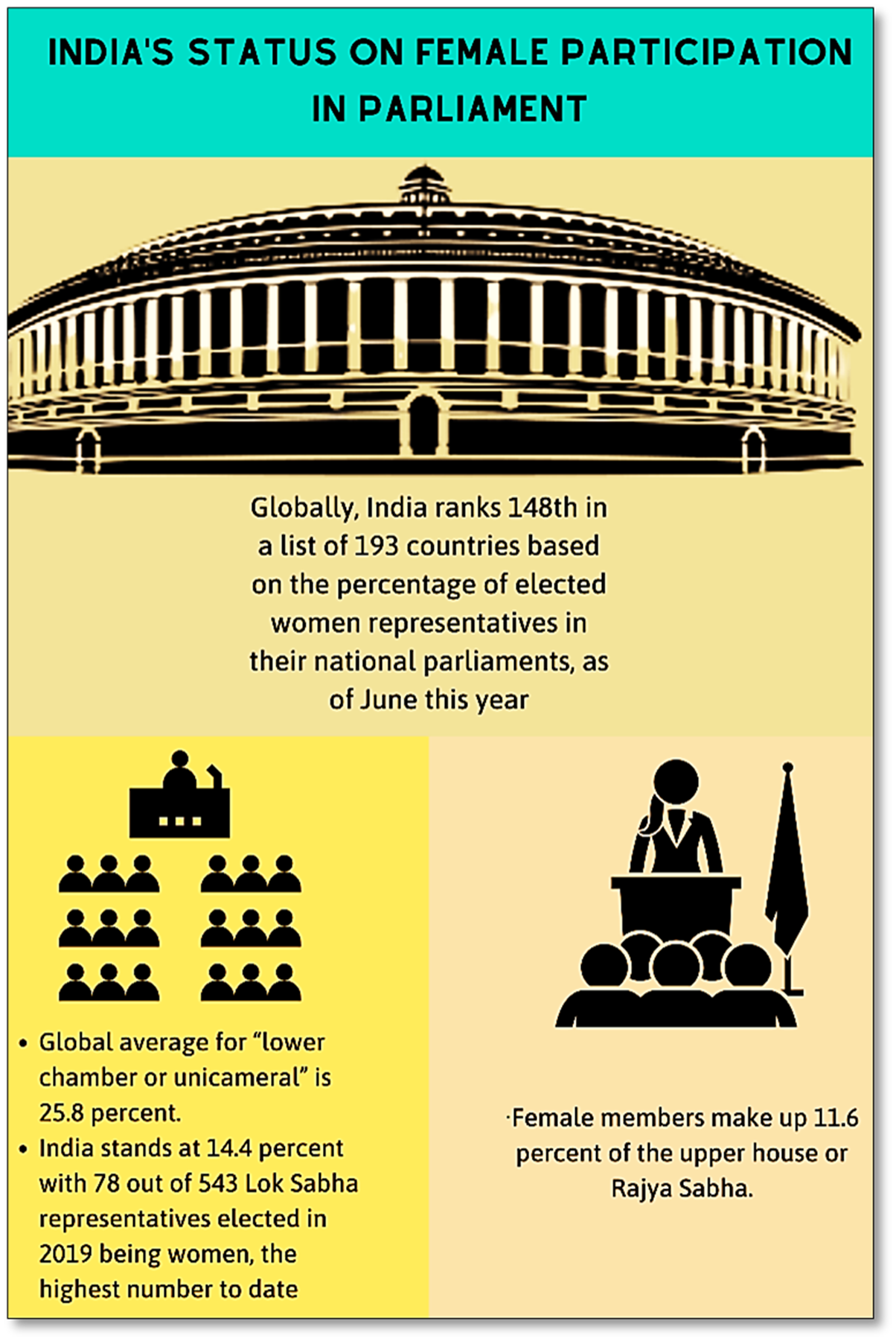
Addressing Gender Disparities
- The bill can contribute to reducing gender disparities in various sectors.
- It is including education, employment, and healthcare, as women’s concerns and priorities are more likely to be addressed.
International Commitments
- India is a signatory to international agreements and conventions that call for gender equality and women’s empowerment.
- Implementing the Women’s Reservation Bill demonstrates India’s commitment to these international obligations.
- The bill encourages political parties to promote women leaders and give them opportunities to contest elections, which can lead to a more inclusive and diverse political landscape.
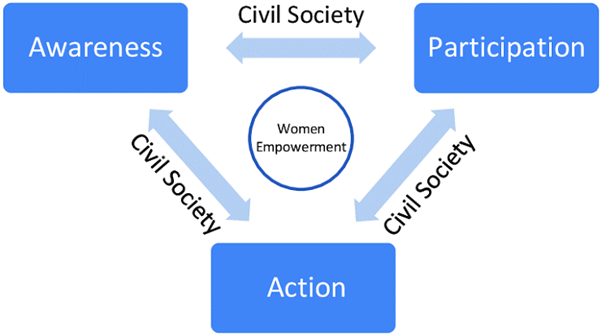
Criticism of the bill
- Two reasons call for criticism of the 2023 Bill.
- First is the implementation schedule’s complexity.
- The Constitution (One Hundred and Twenty-eighth Amendment) Act of 2023 would go into effect once “an exercise of delimitation is undertaken for this purpose after the relevant figures for the first Census taken after that date have been published”.
- The election cycle from which women will get their fair share is not specified.
- Second, the new Bill does not offer women’s reservation in the Rajya Sabha and state legislative councils, in keeping with the previous regimes.
- Women are currently underrepresented in the Rajya Sabha compared to the Lok Sabha.
- The Lower and Upper Houses must both adhere to the concept of representation.
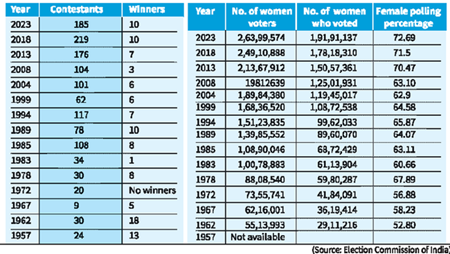
- Previously, numerous critical arguments against the reservation for women in politics had surfaced-
- Some argue that reservation policies can lead to tokenism.
- Moreover women are seen as filling quotas rather than being genuinely supported and empowered.
- There can be resistance and backlash against women in leadership roles, which may not necessarily dismantle entrenched patriarchy.
- Reservation policies typically apply to political representation but may not address broader societal and cultural norms that perpetuate patriarchy.
- The effectiveness of reservation policies may vary for women of different social, economic, and cultural backgrounds.
- The overlapping of multiple forms of discrimination—needs to be considered.
- Reservation policies may be a starting point, but achieving lasting change in gender equality requires addressing systemic issues beyond political representation.
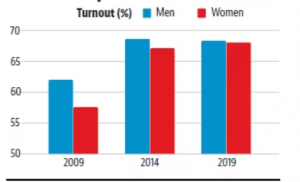
The status of Women Reservation in India
- Gujarat – It is elected just 8% of women legislators in its 182-member assembly.
- Himachal Pradesh – Where every second voter is a female, it has elected 67 men and only 1 woman.
- National average – The national average of women in all state assemblies remains around 8%.
- Rankings – India ranks 144 out of 193 countries in the representation of women in parliament according to Inter-Parliamentary Union’s report.
- Among our immediate neighbors, India falls behind Bangladesh, Pakistan, and Nepal.
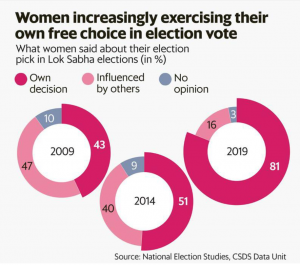
Importance of the bill
- Women have historically suffered due to systemic inequality and barriers.
Caste groups
- Any scheme of women’s reservation must be within the constitutional tenets and must also account for its representation across caste groups.
Gender quota
- Without a gender quota, women’s representation will continue to remain marginal causing a massive deficit in our democracy.
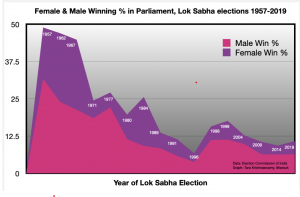
Panchayats
- Some recent studies on panchayats have shown the positive effect of reservation on empowerment of women and on allocation of resources.
Vote share
- Though women’s vote share has increased the number of women in positions of power has not increased.
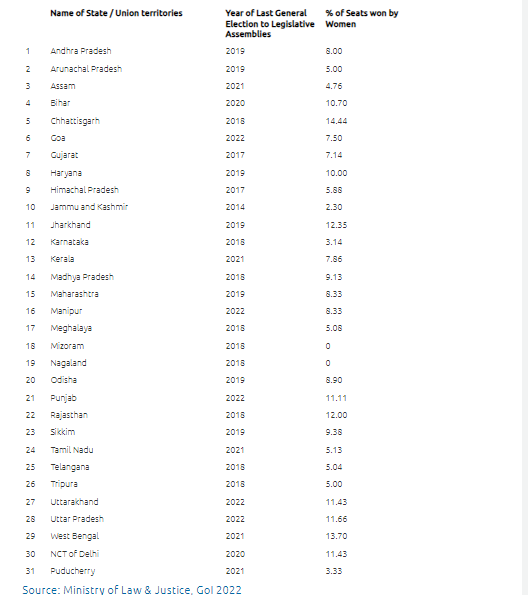
Way forward
- With its massive women population, India has a huge reservoir of potential which, if unleashed, will take the country much ahead.
- Women’s reservation will jump-start the democratic process.
- It is allowing significant majority to have a say in how their lives must be governed.
- Reservation for women in politics can be a valuable tool in challenging patriarchy and promoting gender equality.
- But it should be part of a broader strategy that addresses cultural norms, education, economic empowerment, and social change to create a more inclusive and equitable society.
- Additionally, the impact of such policies can vary, and their success depends on various factors, including their design and implementation.
- According to the United Nations, this quota reserving 33% seats for women will leapfrog India into one of 64 countries around the world.
- It have reserved seats for women in their national Parliaments.
- Typically, achieving a critical mass of 30 percent representation by women in Parliament is known to yield positive outcomes for women’s empowerment.
- However, we hope that implementing such reservations will ultimately lead to achieving 50 percent representations of women in Parliaments across the globe.
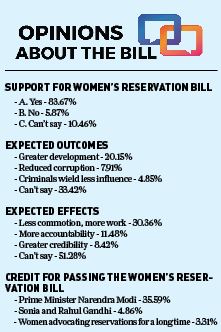
-------------------------------------
Leave a Reply
Your Comment is awaiting moderation.


